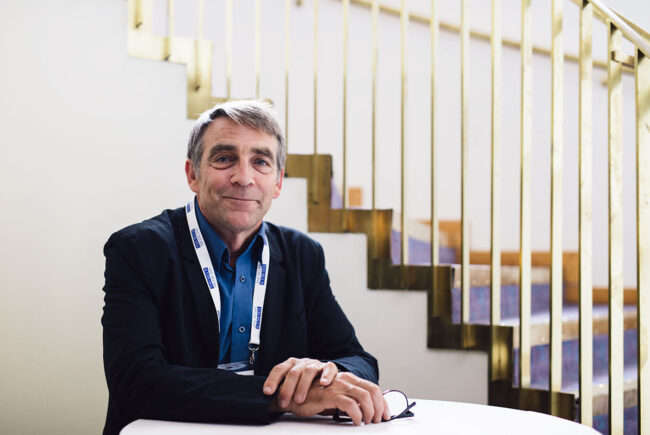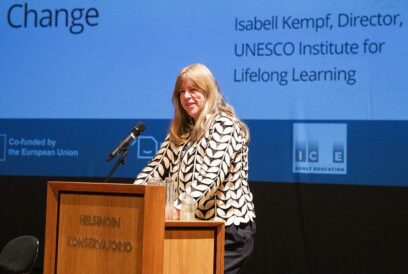

In his research, Alan Cassels criticises a phenomenon called disease mongering, which means, in simpler words, “selling disease”.
In his research, Alan Cassels criticises a phenomenon called disease mongering, which means, in simpler words, “selling disease”.
It’s not healthy to tell healthy people that they are sick when they are not, says Canadian non-fiction author Alan Cassels. In his books and research, he calls for better medical literacy skills for both doctors and their patients.
What is disease mongering?
“Disease mongering is the widening of disease definitions so that it captures more and more healthy people and threatens to turn them into patients.
The term was coined in the early nineties by a writer called Lynn Payer, in a book called Disease mongers.
Disease mongering is a global phenomenon. It’s probably not as bad in Canada or Europe as in the USA, and not as bad in countries where you have a good socialised health care system. It is much worse in the USA, a big capitalised market place where you are selling treatments and convincing insurers to pay for them.
Typically, disease mongering is characterised by exaggeration of normal human traits.
For example, women who live long enough will go through menopause. It might be uncomfortable, but it is normal natural thing. But if pharmaceutical companies and their experts would take that and say, ‘it’s a disease that needs a drug treatment’, that would be disease mongering.”
Alan Cassels
- is a Canadian researcher, journalist and nonfiction author
- His publications include Selling Sickness: How the World’s Biggest Pharmaceutical Companies are Turning us All into Patients(2005), together with Ray Moynihan.The ABC’s of Disease Mongering: An Epidemic in 26 Letters(2007); Seeking Sickness: Medical Screening and the Misguided Hunt for Disease (2012) and The Cochrane Collaboration: Medicine’s Best-Kept Secret (2015).
Are there some sectors in health care that are particularly prone to disease mongering?
“We see it everywhere. But many times, it comes down to how big the market can be. If you’re selling a treatment, you don’t want to limit it to a small pool of sufferers, you want it to be as large as possible.
The most energy behind disease mongering is concentrated around difficulties that many or most of us will have at some point in our lives: osteoporosis, high blood pressure, menopause, toe nail fungus, sexual difficulties, social anxiety…
A certain percentage of children will have difficulties sitting still in the classroom. Are they diseased or do they just have a lot of energy?
Mental health conditions are also especially prone to it because often there is no easy way to define what the disease is. Are you unconformable about a presentation at work or standing up and saying something at a funeral? Then it could be social anxiety, there is a drug for that!
Also, a certain percentage of children will have difficulties sitting still in the classroom. Are they diseased or do they just have a lot of energy? Maybe at the extreme end, there are some children who have brain problems, and treatment with ADHD drugs might be appropriate, but the vast majority are just normally energetic children. A good doctor would say, you should try to get more sleep, improve your diet, but you might also need a drug. But for many, that’s the punchline.
Another example, there is a chapter in our book about Hypo-active sexual desire disorder (HSDD). We documented pharmaceutical industries’ effort to put sexual disinterest into the concept of a disease. For men it’s easy: it’s a plumbing problem. But for women, it’s extremely difficult. How do you measure sexual desire? But they knew if they were able to do that, they could create a huge market for a drug for female sexual dysfunction.
Sometimes the dysfunction doesn’t have to do with the plumbing, it has to do with the relationship.
So, now there is a drug approved for HSDD for both men and women in Canada and in the USA.
And you might say, well, what’s wrong with that? Because erectile dysfunction is a problem for some men, and those drugs have some degree of benefit. But at the same time, sometimes the dysfunction doesn’t have to do with the plumbing, it has to do with the relationship.
There has been a lot of criticism from many sociologists that are saying that the whole revolution of Viagra, driven by the pharmaceutical industry, has changed the way we perceive human sexuality.”
Who benefits from disease mongering? What are the biggest risks?
“Obviously, the companies that sell products benefit the most. And it’s not just the pharmaceutical industry, it’s also the cosmetic and screening industry and people who sell plastic surgery.
I think it’s clear who benefits. But everyone else loses.
When you start taking normal people and telling them they are abnormal, it is changing the way they think about themselves.
The biggest risk is people ending up taking medications they don’t need. The harm works in three ways. One is economic harm as sometimes the medications are not free.
The other is harm to your body, as taking drugs or going through treatments can be dangerous. For example, there is a whole chapter in our book about unnecessary treatment of prostate cancer after (PSA) testing.
And the third is the harm to your sense of self. When you start taking normal people and telling them they are sick or abnormal, it is changing the way they think about themselves, even if what you’re saying is bullshit.”
Why do people fall for disease mongering?
“It’s partly because we like a quick fix and they often come with a pharmaceutical product. If there is something you worry about and there is a pill that solves the problem, you might want to try it.
It’s not just driven by the pharmaceutical companies, as sometimes people themselves want it. Because the medicine you get validates your own feeling.
It is also due to a more general issue in health care. If you have a problem, you go to a doctor who tells you what kind of problem you have and prescribes you medicine. A lot of people expect that.
So, it’s not just driven by the pharmaceutical companies, as sometimes people themselves want it. Because the medicine you get validates your own feeling. The doctor has acknowledged what you feel as real.”
What does it say about our time, that people are so eager to go through so many screenings and tests, in order not only to find out about disease but also about risk of later disease? Are we afraid?
“Yes, we are afraid. But I don’t think we are born afraid. We become afraid by what we see in the media and by what gets marketed to us. For example, the screening industry is all about screening healthy people.
If you are sick and the doctor does something, there is a chance that your life gets better. But if you are already well, you have no symptoms, it is rare that the doctor can do something to improve your life.
That’s why we, who talk about over-treatment, say that the bar has to be very high: you must have a lot of proof that the treatment will cause more benefit than harm before you start messing with people’s lives.”
Does this then mean that we already have too much information about our health and our bodies for our own good?
“There is too much information, but there is also too much misinformation. People get confused and don’t know what is true and what is false.”
Whose responsibility is it to change this? Doctors? Government officials? Journalists?
“I think journalists have a huge role in improving media literacy and huge responsibility in reporting about health issues properly.
I would also lay a lot of the blame at the feet of our doctors. They are supposed to be independent experts whose only mission is to improve our health. But in fact, I think many physicians don’t realise how much the pharmaceutical industries are getting inside their heads and changing the way they see disease.
You see, drugs are different to other consumer goods. If you want to buy a phone or a pair of shoes, you choose at the shop based on your needs. But for health issues, you mostly cannot go to the pharmacy, you go to the doctor.
Doctors need to realise they should be getting their information from independent people.
So, if you are marketing drugs, you don’t have to market them to the entire population. You can focus on the prescribers.
Should we trust what the oil company is saying about the global warming? So why do we trust what the drug companies are saying about health and health treatments? Doctors need to realise they should be getting their information from independent people.
That’s why medical literacy of the doctors is important in a world of continuing medical education.”
Lastly, in times of a growing share of the population being critical about many well-known treatments, does it worry you to give lectures about corrupted pharma? Are you not worried that what you are saying will directly benefit say, anti-vaxxers and charlatans?
“It’s very easy for people to form tribes of like-minded people in social media over anything. If your child got a brain tumour after getting a vaccine, you’ll find other people who have experienced the same thing. They might live on the other side of the globe, but you can find them on the internet.
Yet, part of the problem is that there is a credibility issue in the normal medical system. If people feel that they have been harmed, not listened to or mistreated by the traditional system, they are going to try other kinds of health care. And then you see the alternative groups using social media to nourish that distrust.
Just because there is evidence that some diseases have been mongered, it doesn’t mean you should throw away the western medicine.
I want to make clear that I’m not an anti-vaxxer, but I think these people who appear to be harmed by vaccines need to be listened to and understood as well, because I don’t think they are all making it up. People sometimes do have good reasons not to trust what the doctors are telling them, for example if they are sending them to screenings when they’re already healthy.
I think things improve through criticism. I think this is what education is about.
Nevertheless, I do fear that the talk about disease mongering will make some people reject everything.
There are very good treatments and surgeries that sick people need. Just because there is evidence that some diseases have been mongered, it doesn’t mean you should throw away the western medicine and resort to crystals or homeopathy.”
Author






